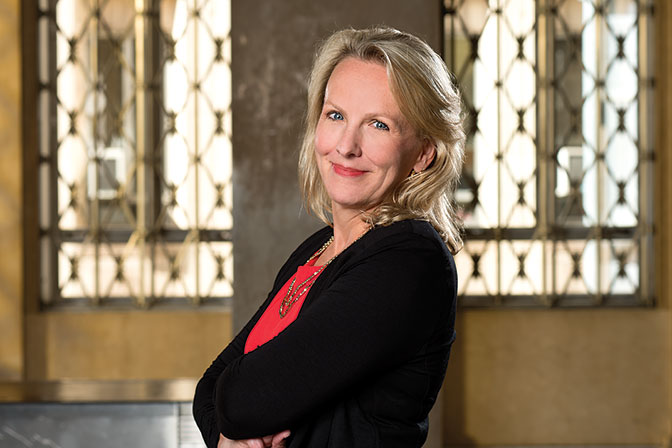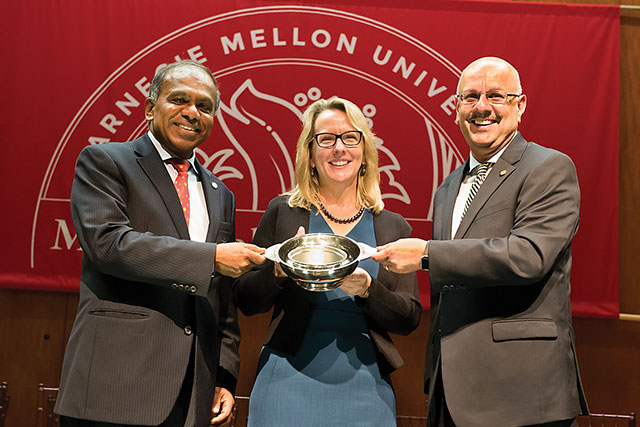

A Conversation with Rebecca Doerge, the New Dean of the Mellon College of Science
Interview by Amy Pavlak Laird
Statistical bioinformatician Rebecca Doerge joined the Mellon College of Science (MCS) as its seventh dean on Aug 1, 2016. Previously the Trent and Judith Anderson Distinguished Professor of Statistics at Purdue University, Doerge served as Head of Purdue’s Department of Statistics from 2010–2015 and oversaw its growth into one of the largest statistics departments in the country. She brings to MCS a career-long commitment to collaborating across disciplinary borders and supporting basic science research. A native of upstate New York, Doerge is a member of the Board of Trustees for the National Institute of Statistical Sciences and the Mathematical Biosciences Institute. She has authored more than 120 scientific articles, published two books and mentored 24 doctoral degree candidates to completion. We sat down with Doerge to discuss why she chose Carnegie Mellon University and MCS, her efforts to cross disciplinary boundaries, and her vision for MCS.
What drew you to Carnegie Mellon and specifically to the Mellon College of Science?
Carnegie Mellon has a great reputation for computing and engineering. The excellence in foundational science at CMU is a well-kept secret that must be exposed, promoted and strengthened. There is huge opportunity to leverage our strengths in analytics and engineering to propel foundational science forward at a faster rate than our peers. We are on an upward trajectory with the new president and the new provost. Plus, it was clear from really early on that the deans of the colleges here are a team that have the best interest of Carnegie Mellon and the students in mind. It was the deans that sealed the deal for me; we are in this together.
Also, when I was interviewing, I learned about how the Mellon College of Science is committed to educating the whole student. That really resonated with me. My hope is for the younger people to change the state of science, for them to be well-balanced and communicative and more integrated into what’s important in the world. The new MCS Core Education gets to the heart of this, and it really is a very forward thinking approach to education.
Your undergraduate degree is in theoretical math. Your Ph.D. is in statistics. And you do research that focuses on genetics. How did that happen?
It wasn’t planned! I said yes to things that interested me, even though I had no idea how I was going to proceed.
I was an undergraduate at the University of Utah in the ‘80s during the first phase of the computer science craze. And I thought, there’s a future in that. I started out in computer science, and I liked programming, but it just wasn’t my thing. But I really liked the math, so I decided to change my degree from computer science to theoretical math. I stayed at the University of Utah and did a master’s degree in theoretical math; during that time I took a statistics class. I did well and thought it was interesting. When I realized that I was going to have to get a job, I went to a probabilist, named Simon Tavaré, and he introduced me to a human geneticist. This is 1986–87, right at the start of the human genome project. I ended up joining a human genetics group at the University of Utah Department of Human Genetics.
What was that like, to join a human genetics group as a theoretical mathematician?
I hadn’t taken a biology class since seventh grade biology. I had no vocabulary. It was the beginning of interdisciplinary research for me, something that was unheard of at the time. In fact, I would love to know what they really thought about me: a woman in a very male-dominated field, good at math, from New York. I stuck out like a sore thumb. But I liked the research, because it was real. I worked there for a year after finishing my master’s. Then I was invited to do a Ph.D. at NC State in statistics and quantitative genetics. That was when I switched from human genetics to agricultural genetics.
Your research now is in the area of statistical bioinformatics. Will you describe your research?
We chase technology and figure out how to design experiments and analyze the data that are collected. Typically, our work is based in genetics, genomics and epigenomics, so the data are DNA- or RNA-based. Our goal is to understand the ultimate function of DNA and epigenomic associations with the genome. Some of what we work on is human cancer. We do proof-of-concept in plants and then spin it off to human applications. We work on real problems that have global impact.
Your research crosses many disciplines, including plant science, human genetics and statistics. How has being interdisciplinary shaped your career?
When I started looking for jobs after my postdoc at Cornell, no one wanted to hire someone who was interdisciplinary. Interdisciplinary research was not cool. At the time (mid-1990s) the trend was to develop deeply in one disciplinary area, and you stayed in it. It was just a function of the time. At Purdue, they actually hired me as an assistant professor with a 25 percent appointment in agronomy (which is the College of Agriculture) and a 75 percent appointment in statistics (in the College of Science). Folklore at Purdue is that I was the first untenured assistant professor that they ever hired jointly.
Do you have any advice for someone who wants to cross a disciplinary boundary, either at their job or in school?
One thing that I had to learn to do is talk across disciplinary boundaries. And to have enough confidence to ask, “What does that mean?” I learned early on that you have to stay at the table. You’re not going to learn how to communicate in a disciplinary manner after an hour. It takes dedication and you have to read and you have to ask questions and you have to dig into the literature.
Carnegie Mellon’s Provost has said that “science is in our DNA as a university.” How do you see MCS’s role at the university and, more broadly, in the Pittsburgh region?
Foundational science, thus science, is the basis of all accomplishments at CMU. Whether it is the DNA of the people that create the incredibly vibrant atmosphere, or the fundamentals of biology, chemistry, mathematics and physics that give rise to the computers we use, the materials we rely on, or the theory that supports discovery, it is all based in science.
Pittsburgh is definitely up and coming. With its dozens of universities and colleges, and so much biotech and tech moving in, I think there’s huge opportunity here to connect to industry, academics, government, etc. that will not only change Pittsburgh but also position Carnegie Mellon in the middle of all of that.
What are you most looking forward to in your first year as dean of MCS?
One of the fun responsibilities that comes with leading a modern college of science these days is to find out where people shine, where their passion lies and how they want to contribute. And to do that, you have to know people. I’m really looking forward to getting to know our alumni, students, faculty and staff. I think that the Mellon College of Science is really well-positioned to shine, and I can’t wait to help us shine brightly.
What’s one thing the MCS community would be surprised to learn about you?
There are two things: First, I have an 8-pound dog named, Mr. BIG. He’s terrific! Second, I have an irrational fear of rodents (terrified of mice… dead or alive!).

In a ceremony held on Oct. 6, Rebecca Doerge (pictured here with President Subra Suresh, left, and Provost Farnam Jahanian) was formally installed as dean of the Mellon College of Science. During the ceremony, she received a Quaich, a Scottish drinking vessel that was traditionally used to offer guests a cup of friendship or welcome. Its two-handled design is a symbol of new ventures and mutual trust between the giver and receiver. The ceremony was the first to be held for a CMU dean. Going forward, each dean will be feted similarly.